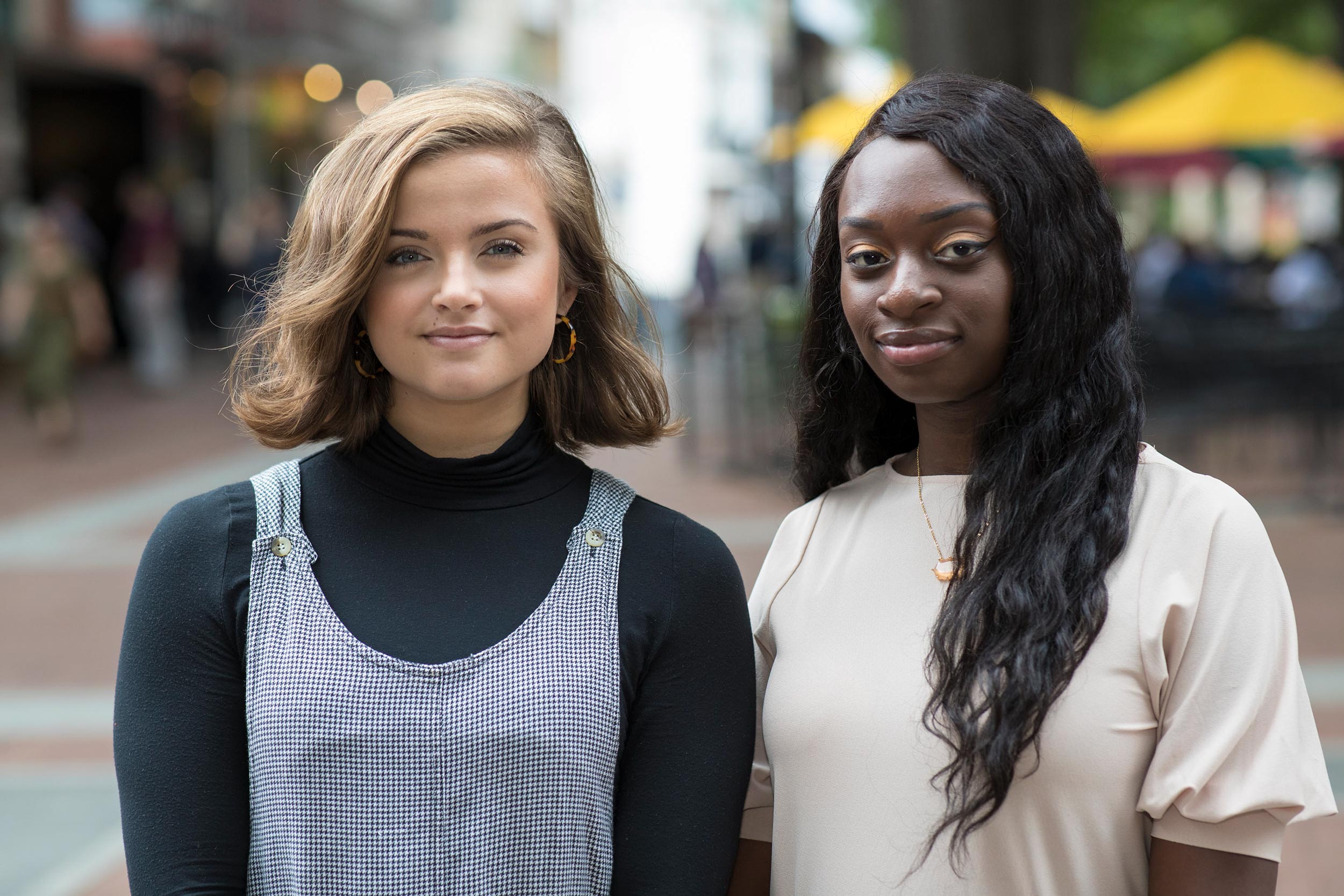On a typical day this summer, University of Virginia media studies students Ali Sullivan and Norah Mulinda might attend a Charlottesville City Council meeting and then write an article, on deadline.
Or live-tweet from a community event.
Or conduct interviews with various sources for longform stories.
Or just sit around the office and pick the brains of their older, more experienced coworkers.
Come to think of it, there really was no typical day for the duo over the summer.
And that’s what made their internship at Charlottesville Tomorrow – an online, nonprofit news organization headquartered on the Downtown Mall – so special.
“Norah and Ali were excellent this summer,” said Elliott Robinson, Charlottesville Tomorrow’s news editor, when asked about the students’ contributions. “They dove straight in and their decision-making often ranked up there with seasoned reporters.
“They worked well independently and with the news team, and it was a great help when they both decided to extend their time with us to help cover the Aug. 12 anniversary. They both have bright futures ahead, and I’m excited to see what’s next for them.”
UVA Today caught up with Sullivan, a third-year student from Colorado Springs, Colorado, and Mulinda, a third-year student from Roanoke, to hear more about their experience.
Q. How did you wind up interning at Charlottesville Tomorrow?
Sullivan: While searching for a summer internship, I knew I wanted to work in a local newsroom. I saw an internship posting for Cville Tomorrow and realized it’d be the ideal opportunity to learn more about Charlottesville from a new, non-student perspective.
On top of that, the current editor-in-chief of the Cavalier Daily, Gracie Kreth, had interned there the summer before. She talked to me about her experience and gave me a few tips for the interview. Luckily, I got the job!
Mulinda: I was blessed with the opportunity to be an Emma Bowen Foundation fellow. The Emma Bowen Foundation is an organization that places minority students who are interested in journalism, media and technology at reputable companies for multi-year, paid summer internships. Charlottesville Tomorrow is a partner company for the program, so it was great to gain experience with journalistic writing right here in Charlottesville!
Q. Did you guys work together?
Sullivan: We did! Norah and I collaborated on a few articles and went to several local government meetings and community events together. Going to those sorts of events alone can be daunting, so I’m glad we could cover them as a team.
Mulinda: Ali and I worked together on several articles concerning government and land use, but we also each focused on our respective longform stories for Charlottesville Tomorrow. My longform project focused on how students are disciplined in a public education system.
Q. What were some of your more memorable assignments? Any highlights?
Sullivan: Over the summer, Norah and I both worked on individual summer-long projects. I focused on housing choice voucher discrimination – a nationwide problem to which Charlottesville is no exception. Throughout the summer, I had the opportunity to talk with local nonprofit leaders and those experiencing housing difficulties themselves.
My favorite part of journalism is talking with people about their passions, so discussions with nonprofit leaders who have dedicated their lives to equity issues – like housing – were really wonderful and informative experiences.
Before working on this assignment, I didn’t know much about housing vouchers, nor the problems that voucher holders experienced. Affordable housing is a hot-button issue in Charlottesville, so I’m glad I got to focus in on a small but critical aspect of that topic.
Mulinda: A memorable assignment for me was the John Henry James historical marker unveiling, because it was my first solo byline with Charlottesville Tomorrow, and it was an indication to me of how connected the Charlottesville community can be.
An internship highlight for me would be our staff meetings, because Ali and I were able to hear what happens behind the scenes in the newsroom and actually provide suggestions for the organization that were valued, acknowledged and often implemented.
Q. Overall, was this a valuable experience?
Mulinda: It was definitely a valuable experience. Charlottesville Tomorrow granted me with creative freedom in my work and provided me with individualized guidance, direction and critiques. The organization supported my professional development endeavors at both the National Association of Black Journalists Convention in Miami, Florida, and the Emma Bowen Foundation Conference in New York City. Charlottesville Tomorrow truly facilitated my growth as a journalist.
Sullivan: Absolutely. Although I had written about Charlottesville in the past for the Cav Daily, I was never able to immerse myself in city politics and issues like I was able to at Charlottesville Tomorrow. I left the summer feeling like an active and informed Charlottesville resident – not just a college kid passing through.
Q. How has the experience affected your interest, if at all, in someday working in the media?
Sullivan: I was interested in a career in journalism before working at Charlottesville Tomorrow, but this summer confirmed my passion for news media. Cville Tomorrow focuses on hyperlocal quality of life issues, which, to me, is a really unique and inspiring mission – especially given the current state of local news. If I do end up working in media, I definitely plan to keep those community values in mind.
Mulinda: My experience at Charlottesville Tomorrow helped to solidify my passion for a career in journalism and taught me that I can be successful in the field. I plan to take what I’ve learned and the skills I acquired at Charlottesville Tomorrow to all of my future journalistic experiences!
Media Contact
Article Information
September 19, 2019
/content/media-studies-students-gain-valuable-experience-charlottesville-tomorrow

